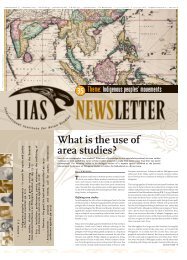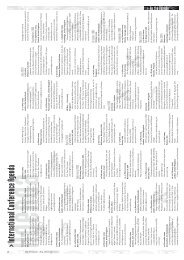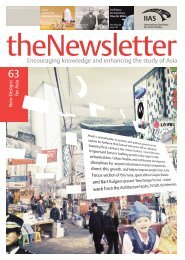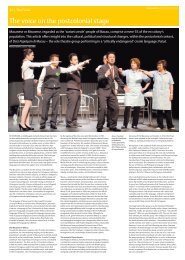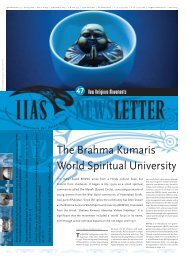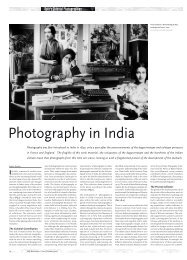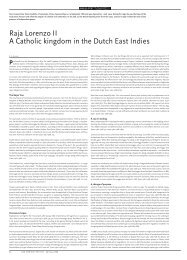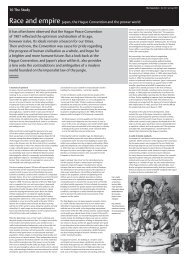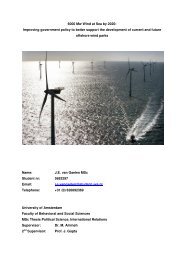Sex, love and revolution - IIAS
Sex, love and revolution - IIAS
Sex, love and revolution - IIAS
Create successful ePaper yourself
Turn your PDF publications into a flip-book with our unique Google optimized e-Paper software.
R e s e a r c h<br />
In late Qing <strong>and</strong> Republican China controversy arose over the name of the year <strong>and</strong> calendrical basis of the date. For<br />
more than two millennia, years were calculated eponymously in accordance with the emperor’s reign, but in the late Qing<br />
reformers <strong>and</strong> <strong>revolution</strong>aries began proposing alternatives. The Republicans adopted the solar calendar, resulting in a<br />
series of clashes with the lunar calendar-loving public. The ensuing battle over the calendar became entangled with a host<br />
of issues concerning national identity, cultural traditions <strong>and</strong> the meaning of modernity.<br />
Modern times:<br />
the meaning of dates <strong>and</strong> calendars in Modern China, 1895-1935<br />
Lane J. Harris<br />
Chinese lunar New Year has become a<br />
global holiday, but in the late 1920s<br />
the Chinese Nationalist Party banned this<br />
celebration along with the lunar calendar<br />
upon which it is based. For more than two<br />
millennia, Chinese calculated time, celebrated<br />
festivals, observed religious rites,<br />
shaped business practices, <strong>and</strong> scheduled<br />
important events in accordance with the<br />
<strong>revolution</strong>s of the moon. Coupled with the<br />
lunar calendar was the imperial system of<br />
eponymous dating using the first year of<br />
an Emperor’s reign as year one. In the late<br />
19 th century reformers <strong>and</strong> <strong>revolution</strong>aries<br />
attacked eponymous dating as indicative<br />
of the Manchu Qing’s failure to modernise.<br />
In the 20 th century, the Nationalists’<br />
ban of the lunar calendar produced clashes<br />
with the public over issues of national<br />
identity, cultural traditions, <strong>and</strong> the meaning<br />
of modernity.<br />
The Anti-Manchu Years,<br />
1896-1911<br />
Following China’s defeat in the Sino-Japanese<br />
War (1894-95), government reformers<br />
began to search for solutions to China’s<br />
continued weakness. The scholar <strong>and</strong><br />
political reformist, Kang Youwei, taking<br />
a page from Max Weber, argued that as<br />
Western economic growth was based on<br />
Christianity the Chinese should institutionalise<br />
Confucianism as their state religion.<br />
One manifestation of this goal was Kang’s<br />
proposal to rename the year from Guangxu<br />
24 (1898) to Confucius 2475. Kang did not<br />
intend to undermine the emperor, but to<br />
create a religious orthodoxy fostering political<br />
reform <strong>and</strong> economic growth. Liang<br />
Qichao, Kang’s most famous student, was<br />
more ambivalent. He initially advocated<br />
a dating system ignoring both Confucius<br />
<strong>and</strong> the emperor <strong>and</strong> based on the Yellow<br />
Emperor, the earliest ancestor of the Han<br />
people, but later flip-flopped emphasising<br />
how a Confucian dating system would foster<br />
historical memory, religiosity, <strong>and</strong> patriotism<br />
among the people. 1<br />
The calendrical reforms proposed by the<br />
<strong>revolution</strong>aries, by contrast, were motivated<br />
by their anti-Manchu <strong>and</strong> anti-monarchical<br />
goals. In July 1903, classical scholar,<br />
Liu Shipei argued that dating in accordance<br />
with the Yellow Emperor would “raise racial<br />
feeling among the Han”. Liu rejected the<br />
Confucian dating system because it erased<br />
millennia of Chinese history before Confucius.<br />
Supporting the Yellow Emperor was<br />
also a statement on identity that marginalised<br />
the hated Manchus while incorporating<br />
all Han Chinese. Shortly thereafter,<br />
a number of pro-Republican newspapers<br />
<strong>and</strong> journals such as Jiangsu rejected the<br />
eponymous dating system <strong>and</strong> adopted<br />
Liu’s Yellow Emperor calendar. 2<br />
Dualling calendars (1912-1927)<br />
The battles over the eponymous dating<br />
system were concluded after the 1911<br />
Republican Revolution when Sun Zhongshan,<br />
President of the Provisional Government,<br />
announced the adoption of a dating<br />
system based on the founding of the<br />
Republic <strong>and</strong> the Gregorian solar calendar<br />
as the state calendar.<br />
Sun Zhongshan argued that the system<br />
would help people remember the founding<br />
of the Republic, reduce the number of<br />
calendrical adjustments - especially the<br />
troublesome lunar intercalary months<br />
- <strong>and</strong> facilitate international trade <strong>and</strong><br />
foreign relations by using the same calendar<br />
as the West. The Parliament of the<br />
Provisional Government accepted Sun’s<br />
rationale, but compromised by ordering<br />
that lunisolar calendars, rather than solar<br />
calendars, would be published <strong>and</strong> distributed<br />
by the government. Old lunar calendar-based<br />
customs could continue, but all<br />
references to superstitions or deities must<br />
be abolished from the new calendars.<br />
On 13 January 1912, Sun Zhongshan<br />
ordered the Ministry of Interior to compile<br />
the new calendar. The Beijing Central<br />
Observatory was established to produce<br />
the official state calendar. The long-time<br />
<strong>revolution</strong>ary <strong>and</strong> eminent Belgian-educated<br />
astronomer Gao Lu was named head<br />
of the Observatory. Gao’s calendars for<br />
the first <strong>and</strong> second years of the Republic<br />
eliminated all references to superstition,<br />
arranged the calendar according to solar<br />
month, <strong>and</strong> included information on <strong>revolution</strong>ary<br />
holidays <strong>and</strong> commemoration<br />
days. Traditional names for lunar holidays<br />
such as ‘Spring Festival’ were dropped<br />
<strong>and</strong> replaced with general terms such as<br />
the ‘First Day’. 3<br />
During the early 1920s, a few government<br />
officials tried various methods to promote<br />
the solar calendar. One such method was<br />
Gao Lu’s attempt to have everyone shift<br />
their birthday to its solar equivalent. Gao’s<br />
radicalism went furthest in 1924 when he<br />
eliminated all lunar dates from the state<br />
calendar. This step brought protests from<br />
throughout society <strong>and</strong> various official provincial<br />
sources. In the face of such protests<br />
the weak Central Government ordered a<br />
return to the lunisolar calendar for 1925.<br />
Despite the efforts of progressives like<br />
Gao Lu, the conservative warlord leaders<br />
of the Beijing Government did little to promote<br />
the solar calendar save allowing the<br />
more liberal members of its Ministries to<br />
give solar New Year as a holiday. In a political<br />
culture based on traditional practices,<br />
innovations like eliminating the lunar calendar<br />
harmed the Government’s popular<br />
reputation more than it helped it. In this<br />
milieu, the social <strong>and</strong> cultural practices<br />
based on the lunar calendar including religious<br />
observances, the establishment of<br />
market days, the planting <strong>and</strong> harvesting of<br />
crops, the payment of rents, <strong>and</strong> the clearing<br />
of business debts retained a significant<br />
hold on the public. Private publishers continued<br />
to print lunar calendars containing<br />
all the popular ‘superstitious elements’ so<br />
spurned by the Nationalists, which reportedly<br />
sold well among the people.<br />
Out with the old, in with the<br />
new, 1928-1935<br />
Upon ascending to power after the Northern<br />
Expedition (1926-1928), the Nationalist<br />
Party launched an ambitious series of ‘<strong>revolution</strong>ary’<br />
policies designed to reshape<br />
the polity <strong>and</strong> economy. The promotion of<br />
the solar calendar saw considerable effort<br />
on the part of the Nationalists.<br />
In 1928, Minister of the Interior Xue Dubi<br />
submitted a proposal to the Executive<br />
Yuan on popularising the solar calendar.<br />
Based on this draft, the Nationalists’ Central<br />
Executive Committee, promulgated a<br />
procedure for institutionalising the solar<br />
calendar. By July 1929, this plan was put<br />
in motion by the issuance of National<br />
Government Order No. 543 prohibiting<br />
the printing of lunar calendars for 1930 as<br />
well as banning all lunisolar calendars. In<br />
October 1929, the Executive Yuan issued<br />
Instruction No. 964 ordering that starting<br />
1 January all business accounts, government<br />
<strong>and</strong> private contracts, <strong>and</strong> various<br />
other official documents must only refer<br />
to solar dates. 4 With these orders in place,<br />
the National Government made significant<br />
attempts throughout the late 1920s <strong>and</strong><br />
1930s to eliminate all ‘unscientific’ social<br />
<strong>and</strong> cultural practices attached to the lunar<br />
calendar.<br />
Hu Hanmin, a leader in both the Nationalist<br />
Party <strong>and</strong> Government, pinpointed<br />
businessmen <strong>and</strong> superstitious people<br />
as the two groups primarily responsible<br />
for the persistence of the lunar calendar. 5<br />
Traditionally, merchants cleared their business<br />
accounts, paid salaries, <strong>and</strong> gave<br />
bonuses just prior to the lunar New Year.<br />
Hu held that customary business practices<br />
were unscientific because payments<br />
in accordance with the 13-month lunar calendar<br />
did not match the government’s 12-<br />
month solar calendar payment schedules.<br />
Hu’s arguments were echoed by the Propag<strong>and</strong>a<br />
Department of the Central Executive<br />
Committee of the Nationalist Party<br />
who argued that the scientific accuracy of<br />
the Gregorian solar calendar made business<br />
planning more predictable <strong>and</strong> therefore<br />
more conducive to economic growth. 6<br />
Thus the solar calendar would bring more<br />
uniformity, regularity, <strong>and</strong> predictability to<br />
economic endeavours facilitating the modernisation<br />
of the economy.<br />
The peasants posed a much greater<br />
obstacle to Nationalist Party efforts. The<br />
Nationalist Party considered most common<br />
people to be filled with feudal <strong>and</strong><br />
superstitious thoughts. Only by adopting<br />
the solar calendar, the Nationalists<br />
argued, could the common people begin<br />
the ‘psychological reconstruction’ necessary<br />
to mould them into scientific citizens<br />
of a modern state. Thus the Nationalists<br />
sought to reorient the cultural identity of<br />
the citizenry by breaking their lunar calendar-based<br />
cultural traditions.<br />
Throughout their efforts in calendrical<br />
reform, the Nationalists repeatedly<br />
stressed the modernity of the solar calendar.<br />
They noted that many countries<br />
had adopted the Gregorian calendar in<br />
recent years <strong>and</strong> even the former home of<br />
the Caliphate, Turkey, had ab<strong>and</strong>oned the<br />
Islamic calendar in 1926. The Nationalists<br />
argued that only ‘uncivilised’ peoples like<br />
the ‘American Redman’ <strong>and</strong> ‘African Black’<br />
failed to underst<strong>and</strong> the importance of<br />
calendars <strong>and</strong> thus were without history.<br />
The message was clear, if China remained<br />
superstitiously-attached to the lunar calendar,<br />
they were inviting their status as a<br />
semi-colonial people. 7<br />
With the discursive ground prepared, the<br />
Nationalists issued a series of proclamations<br />
between 1928 <strong>and</strong> 1935 banning<br />
the printing, sale, purchase, or use of<br />
the lunar calendar <strong>and</strong> the celebration of<br />
all lunar holidays. These bans, according<br />
to a large number of both Chinese <strong>and</strong><br />
English editorials <strong>and</strong> newspaper reports,<br />
were largely ignored by the populace who<br />
fought a series of small skirmishes with the<br />
Nationalists to defend their cultural identity<br />
<strong>and</strong> traditions. In 1929 the local police<br />
in the small Gr<strong>and</strong> Canal city of Haizhou,<br />
Jiangsu attempted to stop the public from<br />
laying in the usual stores of rice for the<br />
lunar New Year. The local grain merchants<br />
struck against the government by removing<br />
all their grain from the market. Facing<br />
such concerted action the government<br />
withdrew <strong>and</strong> allowed the people to buy<br />
extra grain. When the Beijing Post Office<br />
refused to deliver ever-popular lunar New<br />
Year greeting cards, wealthier citizens had<br />
them distributed by h<strong>and</strong>. Most violently,<br />
in Suqian, Anhui, the local Small Sword<br />
Society joined forces with Buddhist monks<br />
to rebel against the elimination of the<br />
lunar calendar. 8 These incidents of active<br />
resistance were relatively few in number<br />
compared to the almost universal passive<br />
resistance to government orders to ignore<br />
lunar holidays.<br />
The Nationalist Government realised that<br />
the ephemeral gains to be had by forcing<br />
the calendar issue were not worth the<br />
effort. As with many Nationalist Party initiatives,<br />
the calendar issue simply faded<br />
away. By 1935 the National Government<br />
stopped issuing new proclamations prohibiting<br />
the printing of the lunar calendar<br />
<strong>and</strong> celebration of lunar holidays. The<br />
government achieved some success with<br />
government institutions, mass organisations,<br />
<strong>and</strong> newspapers all recognising the<br />
solar calendar, but the rest of the country<br />
continued to celebrate, worship, plant, <strong>and</strong><br />
conduct their everyday affairs in accordance<br />
with the cultural traditions of the<br />
lunar calendar.<br />
On 1 October 1949 the People’s Republic<br />
of China was established <strong>and</strong> immediately<br />
adopted the solar calendar <strong>and</strong> eliminated<br />
the eponymous dating based on the<br />
founding of the Republic, which is still<br />
used in Taiwan. ‘Superstitious practices’<br />
based on the lunar calendar were reportedly<br />
‘stamped out’, but lunar festivals are<br />
still celebrated. Indeed, celebrations of<br />
Chinese lunar New Year have only grown<br />
over the past century.<br />
Lane J. Harris<br />
PhD c<strong>and</strong>idate in History<br />
University of Illinois, Urbana-Champaign<br />
References<br />
1 Jiao Runming <strong>and</strong> Wang Jiawei. 2004. “Wan<br />
Qing ‘jinian’ lunzheng zhi wenhua jiedu”<br />
(The cultural meaning of the controversy<br />
over chronology in the late Qing). Liaoning<br />
daxue xuebao (zhexue shehui kexue ban)<br />
“Journal of Liaoning University (Philosophy<br />
<strong>and</strong> Social Science Edition) 32-6.<br />
2 Ibid.<br />
3 Zuo Yuhe. 2000. “Cong ‘gao zhengshuo’<br />
dao ‘fei jiu li’: Yangli jiqi jieri zai minguo shiqi<br />
de yanbian” (From ‘changing the imperial<br />
calendar’ to ‘eliminating the old calendar’:<br />
The evolution of the solar calendar <strong>and</strong> its<br />
holidays during the Republican era). Minjian<br />
wenhua luntan “Forum on Folk Culture”<br />
2.<br />
4 Jiangsu sheng zhengfu gongbao (Jiangsu provincial<br />
government gazette) (September<br />
16, 1929); Guizhou sheng zhengfu gongbao<br />
(Guizhou provincial government gazette)<br />
(November 8, 1929).<br />
5 Hu Hanmin. 1978. “Wanquan feichu yinli<br />
shi Sun Zongli yijiao” (Completely eliminating<br />
the lunar calendar is Premier Sun’s<br />
deathbed teaching) in Hu Hanmin xiansheng<br />
wenji (Collected works of Mr. Hu<br />
Hanmin) (Taibei: Zhongguo Guomindang<br />
zhongyang weiyuanhui dangshi weiyuanhui),<br />
3: 731-735.<br />
6 Zhongguo Guomindang Zhongyang zhixing<br />
weiyuanhui xuanchuan bu, ed. 1928. Shixing<br />
guoli xuanchuan dagang (Propag<strong>and</strong>a outline<br />
for implementing the solar calendar).<br />
Nanjing: n.p.<br />
7 Ibid.<br />
8 North China Herald, 23 February 1929, 9<br />
March 1929, 18 February 1930; Shibao, 25<br />
March 1929.<br />
2 0 I I A S N E W S L E T T E R # 4 8 S u m m e r 2 0 0 8



